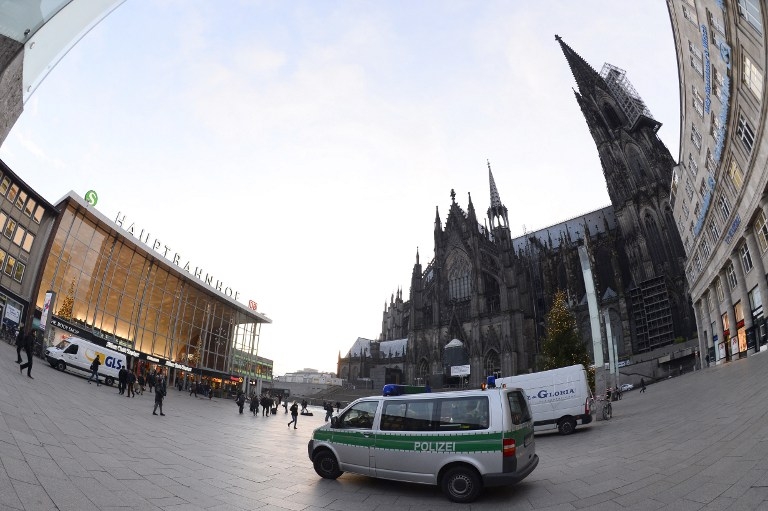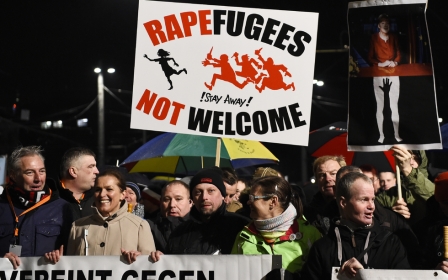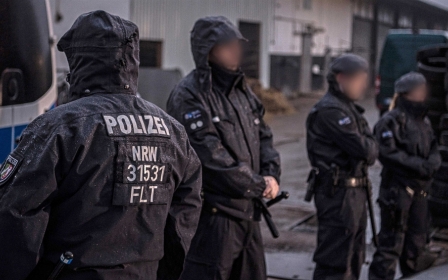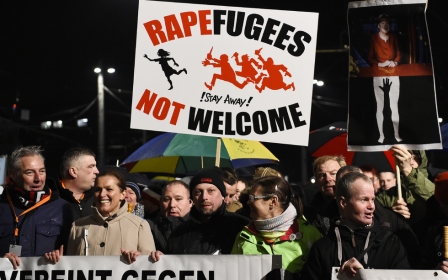The Hamburg verdict: Myths, media and a Muslim monster

Witnesses manipulated by police, frantic media, politicians telling lies. It's a German scandal that could well become one of the largest in recent years. However, given the dominance of anti-Islamic thinking, it is unlikely to happen.
On 1 November, we learned the result of the trial accusing foreigners and refugees of harassing and raping groups of women last New Year’s Eve in Hamburg and across a swathe of German cities, including Cologne.
The verdict was not expected: the court in Hamburg ruled that the police tampered with evidence and manipulated eyewitnesses with regards to their testimonies.
The ruling only concerns that case in Hamburg. A separate ruling for Cologne is expected in April, but it is likely a similar verdict will be handed down.
As one thing leads to another, both politicians and the media have fabricated the “Cologne case” so as to “bolster the police’s statements, roll out supervision of the population, and toughen up laws on foreigners and refugees so as to be able to kick refugees out of the country more quickly,” said Dietmar Henning, a journalist with the World Socialist Website.
In addition to just one person being convicted for the attack, the court’s decision leads us to believe that the “events which occurred on New Year’s Eve” were largely invented by the media. This is a rather scary verdict in light of how much was written about the matter, including pieces criticising the Syrian refugees and denouncing “values” and a “culture” which was not compatible with those in Europe.
Land of make-believe
The first journalist to allude to this was Kamel Daoud, whose column was published in Le Monde last January entitled “Cologne, place of make-believe”, and notably looked at the “relationship to women” in Islam, a world where they are viewed as second-class citizens, according to Daoud.
Women are cast aside, refused, killed, raped, locked away or owned, Daoud argued. The female body is seen not as a fundamental freedom as one of the values in the West, but as one of decadence. It is often simply owned, he said, or “raped”.
It is unacceptable to collectively blame refugees, Arabs in general and Muslims in particular, or incriminating their culture
I was one of the signatories on a column written in response to Daoud's article about the “Cologne rapists”. Our column cast doubt over the fundamentalism of his words and on his hurriedly drawn racist conclusions, but my purpose here is not to say that we were right.
In fact, regardless of the legal outcome of this investigation, whether there are collective convictions for rape or not, the message is the same: we should avoid defining people in relation to their religious beliefs and ethnicity, and we should not focus on “Islam” as the sole source of the perpetrators' motivations.
We never ruled out the fact that Arab men could have committed criminal acts, but collectively blaming refugees, and Arabs in general, and Muslims in particular, and incriminating their culture is ethically and sociologically unacceptable. This is valid for everyone, everywhere, but it should be especially true for Islam today as it comes under so many attacks protected by free speech - sentiments that are apparently accepted even in the upper echelons of the state.
However, following the “Hamburg trial” and the verdict handed down earlier this month, will it be reported and commented on? Will the verdict lead to just as much interest as the “event” itself, the media-created fabrication that "Syrian refugees" had committed a series of gang rapes?
Clearly not. The outcome of the trial does not sell as many papers. It does not fit within the current climate. It does not distil fear and hatred of others - meaning here, of course, Muslims.
The outcome of the trial does not sell as many papers. It does not fit within the current climate. It does not distil fear and hatred of others
Almost no media outlet will report on the verdict of the trial which led to a single - yes, a single - conviction. Where are the journalists, media outlets, researchers, writers, intellectuals and commentators who wrote hundreds of columns, who were interviewed on television and radio, who have shown no repentance for their racist arguments on the basis of inaccurate allegations, for stoking the fire of fear against Islam, for further bolstering the deep-rooted xenophobia and weakening the character Islam in Europe and the Western world?
From Cologne to Donald Trump
I mention the Western world because this scandal transcends European borders and stretches to the US: in an English version of Daoud's article published in the New York Times, the Algerian columnist blamed the supposed perverse relation to the body and sex in Islam as an explanation for the series of gang rapes in Cologne.
And this voice coming from the “south” criticising Islam cannot be accused of racism. No, it is just another stone to the foundations of racism made in America, often combined with the anti-Obama, anti-“Black Lives Matter” and anti-establishment sentiments.
Donald Trump called for Muslims to be “totally” banned from entering the US after the mass shooting in San Bernardino “until the elected representatives in our country understand what is happening”. During his campaign, Trump said that “he had no problem looking Syrian children in the eyes to say that they cannot come here”.
The generalisations made so popular by these intellectuals bolster prejudices that lead to ostracism and, perhaps one election day, a vote for the far-right
Clearly, Trump, Le Pen and Alternative für Deutschland were not expecting a Kamel Daoud or Gilles Kepel, who supported the latter, to develop far-right thinking. But we should not underestimate the strength of words published in the media, the dissemination of such easy statements which are so homogenous and instantly fuel people’s fear, especially when such wide-sweeping statements are made by a representative of the “Arab-Muslim” world.
The generalisations made so popular by these intellectuals bolster prejudices which lead to the refusal of others, ostracism and, perhaps one election day, a vote for the far-right.
Breaking away
Our response to Daoud's article could have been an opportunity to open a debate about ideas. Instead the piece raised so many shields and insults which showed how impossible it is to make progress along such a route given the sheer strength of resistance, prejudice and the stakes of power between intellectuals and politicians in France today that go well beyond our academic remit.
In the wake of this verdict, instead of creating further scandal, let's stop and think for a moment
Sadly, the scandal that surrounded the “Cologne trial” is a sign of the times, unfairly showing the ease with which people belittle Islam as a homogeneous culture developed in its own bubble, passed down from ancestral times and unmalleable.
It is treated as a religion and culture that carries values and standards inherited from the time it was created and incompatible with French society, to simply use the example of a country I know the best.
Along the way, with the “burkini” scandal adding fuel to the fire, we are witnessing the construction, by the media and politicians, of a threatening Islam, one which is entirely monolithic. This process of media fabrication of Islam and the removal of its historicisation has often been fuelled by social science research which has, in turn, been overly influenced by political and security agendas.
We must, therefore, continue to fight against this short-sighted thinking which spans all domains, from academics to the media, as these highways of thought are simply leading to racism and the creation of monsters. Trump has been the beneficiary this month. We need to take care to avoid this kind of thinking or else we will not reach our goal any quicker - and, certainly, we won't reach our goal together.
So in the wake of this verdict, instead of creating further scandal, let's stop and think for a moment. Let's focus on those who fabricated this in order to disseminate their cultural and racist ideologies, and hit where it hurts most.
Let's underline their haste, their shortcuts, their lies, and consider those who contributed to creating this monster which is now propagated on a global scale, the lie which states that Muslims are intrinsically perverted who rape our women in Europe and that our cultures are incompatible.
And in considering these people, let's distance ourselves from this and break away.
- Stéphanie Pouessel is a social science researcher at the Contemporary North African Research Institute (IRMC). As an anthropologist, she is based in Tunis where she leads research into marginal groups in states (cultural minorities, migration and diaspora).
The opinions expressed in this article are those of the author and not necessary those of the Middle East Eye.
Photo: Flowers and a letter reading "One doesn't beat women - not even with flowers" are laid down in front of Cologne's landmark, the Cologne Cathedral, near the main railway station, on 7 January 2016, to commemorate victims of attacks in the Western city during New Year's Eve (AFP)
New MEE newsletter: Jerusalem Dispatch
Sign up to get the latest insights and analysis on Israel-Palestine, alongside Turkey Unpacked and other MEE newsletters
Middle East Eye delivers independent and unrivalled coverage and analysis of the Middle East, North Africa and beyond. To learn more about republishing this content and the associated fees, please fill out this form. More about MEE can be found here.





